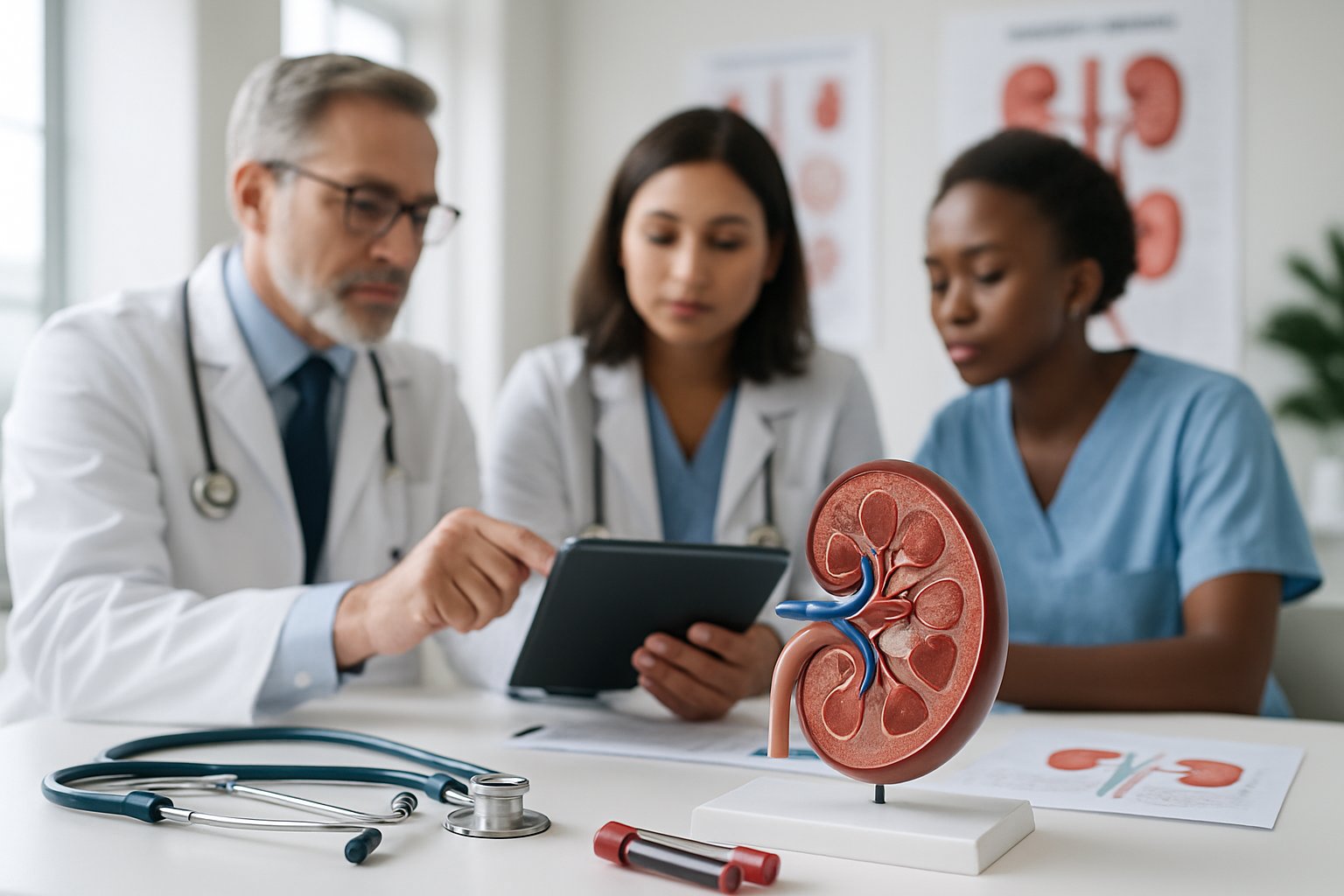GFR improvement takes time and depends on the underlying cause of kidney decline. Controlling blood pressure and blood sugar levels are the most critical steps for protecting kidney function. Avoiding harmful medications and maintaining a kidney-friendly diet can prevent further damage and support recovery
Many people with declining kidney function wonder if they can quickly improve their glomerular filtration rate (GFR). While there’s no instant fix for raising GFR, certain lifestyle changes and medical interventions can help improve kidney function over time, with some people seeing improvements in weeks to months.

The speed at which GFR can improve depends on what’s causing the decline. People with acute kidney injury may see faster recovery than those with chronic kidney disease. Whether someone’s GFR can improve[1] depends largely on the underlying condition and how quickly they address the root causes.
Taking the right steps early makes a significant difference in outcomes. Proven methods to increase GFR[2] focus on protecting the kidneys from further damage while supporting their natural filtering ability. The most effective approach combines dietary changes, blood pressure control, and avoiding substances that harm the kidneys.
Most Effective Strategies to Raise GFR Quickly
Raising GFR requires targeted approaches that address the main factors affecting kidney function. These methods focus on proper hydration, controlling blood pressure and blood sugar levels, following a kidney-friendly diet, and making specific lifestyle changes.
Optimizing Hydration and Water Intake
Proper hydration plays a crucial role in kidney function and can help improve GFR levels. When the body lacks adequate fluids, blood flow to the kidneys decreases, forcing them to work harder.
Staying hydrated helps reduce stress on kidneys[1] as they filter waste from the blood. Dehydration makes blood thicker and harder to filter.
Daily fluid intake should include:
- Water as the primary source
- Clear broths and herbal teas
- Foods with high water content like watermelon
The color of urine serves as a good hydration indicator. Pale yellow or clear urine suggests proper hydration, while dark yellow may signal dehydration.
People should avoid drinking excessive amounts of water, as this can also strain the kidneys. Those with heart failure or advanced chronic kidney disease may need fluid restrictions and should consult their healthcare provider.
Managing Blood Pressure and Blood Sugar
High blood pressure and elevated blood sugar levels create significant stress on kidney filters. Keeping blood pressure and blood sugar within target ranges[1] helps protect kidney function and may improve estimated glomerular filtration rate.
Blood pressure management includes:
- Taking prescribed medications consistently
- Reducing sodium intake to less than 2,300 mg daily
- Regular monitoring at home
Diabetes control requires careful attention to blood sugar levels throughout the day. High glucose damages the small blood vessels in kidneys, leading to permanent scarring.
People with both conditions face higher risks of kidney disease progression. Working closely with healthcare providers to adjust medications and monitor levels helps protect remaining kidney function.
Adopting a Kidney-Friendly Diet
Diet modifications can significantly impact kidney health and GFR levels. A kidney-friendly diet focuses on reducing processed foods and limiting sodium intake[1] while emphasizing fresh, whole foods.
Key dietary changes include:
| Reduce | Increase |
|---|---|
| Processed foods | Fresh fruits and vegetables |
| Fast food and frozen meals | Plant-based proteins |
| Sugar-sweetened beverages | Whole grains |
| Excess sodium | Lean proteins in moderation |
The amount of protein consumed matters for people with kidney disease. Too much protein creates more waste that kidneys must filter, while too little can lead to malnutrition.
People should avoid diets claiming to cure kidney disease, as no such diet exists. Working with a kidney dietitian provides personalized guidance for individual needs and health conditions.
Physical Activity and Lifestyle Adjustments
Regular exercise provides multiple benefits for kidney health and may help improve GFR over time. Physical activity helps control blood pressure, reduces stress, and supports healthy weight[1] maintenance.
Beneficial lifestyle changes include:
- Moderate exercise 150 minutes per week
- Quitting smoking and tobacco use
- Maintaining a healthy weight
- Managing stress levels
Tobacco products damage blood vessels and reduce blood flow to kidneys. Even secondhand smoke exposure increases kidney disease risk.
Weight management reduces the workload on kidneys, especially for people with obesity. Losing excess weight through balanced diet and exercise helps preserve kidney function.
People should use NSAIDs like ibuprofen and naproxen cautiously, as these medications can harm kidneys, particularly when used long-term or in high doses.
Supporting Actions to Prevent Kidney Damage and Sustain Higher GFR

Taking specific steps to protect kidney function involves reducing harmful substances while adding protective foods and lifestyle practices. These actions work together to maintain kidney health and support stable creatinine levels over time.
Reducing Sodium and Processed Foods
High sodium intake forces kidneys to work harder to filter excess salt from the blood. Most adults should limit sodium to 2,300 mg daily, though people with kidney disease may need even less.
Processed foods contain hidden sodium that quickly adds up. Canned soups often contain 800-1,200 mg per serving. Deli meats pack 500-800 mg per 2-ounce portion.
High-sodium foods to limit:
- Frozen dinners and packaged meals
- Canned vegetables with added salt
- Processed cheeses
- Salted snacks and crackers
- Restaurant meals
Reading nutrition labels helps identify sodium content. Choose fresh or frozen vegetables without added salt. Cook meals at home using herbs and spices instead of salt for flavor.
Sugary drinks also stress kidney function. Regular soda consumption links to faster kidney function decline. Replace sodas with water, herbal teas, or sparkling water with fresh fruit.
Incorporating Beneficial Foods and Herbs
Plant-based foods provide antioxidants that protect kidney cells from damage. Fruits and vegetables offer potassium, which helps balance sodium levels when kidney function allows.
Kidney-protective foods include:
- Berries: Blueberries, cranberries, and strawberries contain compounds that reduce inflammation
- Apples: High in fiber and antioxidants while being lower in potassium
- Cabbage: Provides vitamin C and fiber with minimal potassium
- Olive oil: Healthy fats that don’t burden kidney filtration
Whole grains like quinoa and brown rice offer B vitamins and fiber. They help maintain steady blood sugar levels, which protects kidney blood vessels.
Beneficial proteins:
- Salmon and sardines provide omega-3 fatty acids
- Avocado offers healthy fats and fiber
- Plant-based proteins from legumes (when potassium levels permit)
Nettle leaf tea has traditional use for kidney support. Turmeric contains curcumin, which may reduce kidney inflammation when used as a cooking spice.
Limiting red meat reduces waste products that kidneys must filter. Choose lean poultry, fish, or plant-based proteins more often.
Avoiding Harmful Medications and Toxins
Over-the-counter pain medications can damage kidneys when used regularly. NSAIDs like ibuprofen can harm kidney function[3] when taken frequently or in high doses.
People with reduced kidney function should avoid ibuprofen, naproxen, and similar medications. Ask healthcare providers about safer pain relief options like topical creams or acetaminophen.
Smoking damages blood vessels throughout the body, including those in the kidneys. Quitting smoking can slow kidney damage[3] and improve overall health.
Other substances to limit:
- Excessive alcohol consumption
- Herbal supplements without medical approval
- Energy drinks with high caffeine content
- Contrast dyes (discuss alternatives with doctors)
Some prescription medications also affect kidney function. Never stop prescribed medications without medical guidance, but discuss kidney-friendly alternatives when possible.
Long-Term Kidney Health Maintenance
Regular monitoring prevents kidney damage from progressing to kidney failure requiring dialysis or kidney transplant. Blood tests track creatinine levels and GFR changes over time.
Exercise supports kidney health by improving blood pressure and blood sugar control. Yoga and walking are gentle options that most people can do safely. Physical activity helps kidneys heal by improving circulation.
Vitamin D deficiency affects kidney function since kidneys help activate this vitamin. Blood tests can identify deficiency, and supplementation may help when appropriate.
Key maintenance habits:
- Annual kidney function testing
- Blood pressure monitoring
- Managing diabetes if present
- Staying adequately hydrated
- Maintaining healthy weight
Early intervention prevents progression from mild kidney damage to severe kidney disease. People with family history of kidney problems should monitor function more closely.
Working with healthcare providers ensures proper kidney health maintenance. They can adjust medications, recommend appropriate plant-based foods based on potassium needs, and monitor for complications before they become serious.
Frequently Asked Questions

People often want to know about specific foods, drinks, and activities that can help their kidneys work better. Managing blood pressure and getting medical help are also common concerns for those looking to improve their kidney function.
What dietary changes can improve my glomerular filtration rate (GFR)?
A kidney-friendly diet focuses on reducing sodium, processed foods, and excessive protein. Fresh fruits and vegetables provide antioxidants that help reduce kidney damage.
Whole grains and healthy fats support overall kidney health. Foods high in antioxidants help combat inflammation[2] that may harm kidney function.
Limiting phosphorus and potassium may be necessary depending on kidney function levels. A dietitian can help create a meal plan that fits individual needs.
Are there specific hydration practices that can boost kidney function?
Drinking adequate water helps kidneys filter waste more effectively. The right amount varies by person and kidney function level.
Staying hydrated supports optimal filtration by the kidneys[2]. Too much water can strain damaged kidneys, so people should follow their doctor’s advice.
Those with advanced kidney disease may need to limit fluid intake. A healthcare provider can determine the best hydration plan.
Can exercise impact my GFR and if so, how?
Regular physical activity improves blood flow to the kidneys. Better circulation helps the kidneys filter waste more efficiently.
Exercise improves cardiovascular health which directly benefits the kidneys[2]. Walking, swimming, or cycling for 150 minutes per week can help maintain kidney function.
Exercise also helps control blood pressure and blood sugar. Both factors directly affect how well kidneys work over time.
What supplements or vitamins are linked to increased kidney health?
Some studies suggest omega-3 fatty acids may help protect kidney function. Vitamin D deficiency is common in people with kidney disease and may need correction.
B vitamins and vitamin C can support kidney health when taken in appropriate amounts. Too much of certain vitamins can harm kidneys, especially vitamins A and E.
People should always check with their doctor before taking supplements. Some vitamins and minerals need to be limited when kidneys aren’t working well.
How does managing blood pressure help with raising GFR?
High blood pressure is one of the leading causes of decreased GFR[2]. Controlling blood pressure protects the small blood vessels in kidneys.
Blood pressure medications like ACE inhibitors can help preserve kidney function. These drugs reduce pressure on kidney filters and may slow further damage.
Lifestyle changes like reducing salt and staying active also help control blood pressure. Regular monitoring helps track progress and adjust treatments as needed.
Are there any medical treatments available to enhance GFR levels?
The type of treatment depends on whether someone has acute kidney injury or chronic kidney disease. Healthcare professionals can determine if kidney problems are temporary or long-term[1].
Medications can treat underlying conditions like diabetes and high blood pressure that damage kidneys. Treating infections or removing blockages may help restore kidney function quickly.
In chronic kidney disease, treatments focus on slowing further damage rather than reversing it. Early treatment gives the best chance for maintaining kidney function.
References
- Can my GFR get better?. https://www.kidney.org/kidney-topics/can-my-gfr-get-better Accessed October 25, 2025
- Top 5 Proven Methods to Increase Your Glomerular Filtration Rate. https://www.consumersearch.com/health-beauty/top-proven-methods-increase-glomerular-filtration-rate Accessed October 25, 2025
- Low eGFR Explained: 6 Tips to Slow Kidney Damage and Stay Healthy. https://www.kidney.org/news-stories/can-you-improve-your-egfr-what-science-says Accessed October 25, 2025
